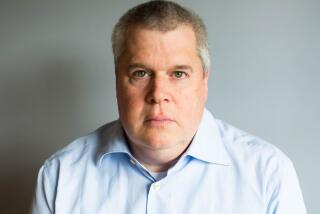Cancer Patient Seeks Caring in Immune System
One day Evan Handler was a 24-year-old understudy in a Broadway hit, a professional actor with a promising career who was poised to embark on the national tour of a Neil Simon play. The next day he was patient number 865770 at Memorial Sloan-Kettering Cancer Center in New York, a terrified and very sick man “thrown into a world I didn’t even know existed.” During the next three years, Handler said, he became the recipient “of some of the very best and the very worst health care our nation has to offer.”
Now 36, Handler has survived acute myelogenous leukemia--twice--as well as several harrowing courses of aggressive chemotherapy with its myriad life-threatening side effects.
In 1988, Handler left Sloan-Kettering, where he was being treated for the second time, and went to Johns Hopkins Hospital in Baltimore. There he received what was then a highly experimental and extremely risky new treatment: an autologous bone-marrow transplant.
The cancer has not returned, and Handler is considered to be cured of a cancer that, when he was diagnosed 12 years ago, was considered incurable.
Since then, Handler has resumed his acting career--he appeared last year in the Mel Gibson movie “Ransom”--and has written a searing, passionate and ironic account of his experiences titled “Time on Fire: My Comedy of Terrors” (Henry Holt, 1996), based on Handler’s one-man off-Broadway play of the same name. Its premise, Handler said, is that “the truly horrible and the hysterically funny [can] exist right next to each other.”
That was the theme of his 90-minute appearance recently in Washington before an unusual audience: nearly 4,000 physicians and medical practice administrators who attended the Medical Group Management Assn.’s annual convention.
Handler’s performance, which received a standing ovation, was a striking departure for a conference that focused on topics such as “positioning,” “vertical integration” and “physician extenders”--the new parlance of the business health care has become.
And that, said conference chairwoman Ann C. McFarland, is what made Handler’s perspective as a patient advocate necessary.
“We in health care get so wrapped up in making the process work that we forget the recipient--the patient,” said McFarland, vice president of a medical practice management company in Los Angeles. “I’ve been a patient myself for a serious illness, so I can empathize. Too often, we forget the patient, and Evan Handler reminds us of that.”
In vivid and unsparing terms, Handler recounted his first day at Sloan-Kettering, a hospital he and his parents chose because of its august reputation and its proximity to their homes.
“I expected to be treated as someone who was in great emotional pain and about to undergo great physical pain as well,” recalled Handler. “And that’s exactly how I was to be treated--New York style.”
He recounted his admission: the young intake clerk who scowled furiously as she fired unintelligible questions in his direction without looking at him; the hordes of sick patients attached to dilapidated IV poles packed into grim waiting rooms where they sat passively for hours waiting for a test or a doctor.
Handler described his initial meeting with his oncologist, who assiduously avoided eye contact and who “seemed terribly uncomfortable being around anyone who’s sick.” He said the attending doctor tossed a sheaf of informed-consent forms for an aggressive and experimental chemotherapy protocol on Handler’s bedside table without explanation and then waited impatiently for his signature, saying treatment couldn’t start until the forms were signed. When he endured the first round with relative ease, he said his oncologist, rather than being encouraging, seemed inexplicably irritated.
“I was constantly being sent for tests with no warning or information provided to me,” he recalled. “A nurse would simply arrive in the room and announce that they were ‘ready for me.’ And I was expected to go. If I asked why a test was needed, I was told that it was needed because they wouldn’t treat me without it.”
When he returned home after a month in the hospital, Handler found an $83,000 bill from the hospital waiting for him. The bill was stamped with the ominous warning: “Your account is now overdue. Please remit in 10 days or your account will be turned over to a collection agency.”
As his treatment progressed, Handler adopted an approach that was markedly different from the passivity he said other patients displayed.
“For every push I got from them,” he said of the hospital, “I gave a shove back.” He figured out a way to cut what could be a six-hour wait in the outpatient clinic to two to four hours by using a blood bank on a different floor, a feat accomplished, he said, by forging a doctor’s illegible signature. “I became a thief,” he said. “I collected stolen moments in the hope that they would add up to an extra day.”
Nearly two years to the day after he was first admitted, Handler was back at Sloan-Kettering after suffering a recurrence of leukemia. During one horrific period, beset by raging fevers the doctors could neither control nor explain, an oncology nurse stopped by. She had visited him during one of his first nights in the hospital, terrifying Handler by asking him whether he thought he was going to die.
“Do you think you’re getting the right care here, Evan?” Handler said the nurse asked him. “Do you think you’re going to get well here?” When Handler said no, she replied, “Then you won’t. Get out, Evan, get out before it’s too late.” At that moment, Handler said, he realized that she was not a sadist but a savior.
Avice Meehan, vice president of public affairs for Sloan-Kettering, declined to comment on the specifics of Handler’s account. “For more than a century, Memorial Sloan-Kettering has had a single goal, which is to provide the best possible care to cancer patients,” she said. “We strive to meet the full range of a patient’s needs, and we recognize that a cancer diagnosis and subsequent treatment require great sensitivity to the physical and emotional stresses. Mr. Handler has enjoyed considerable success in his acting career, and I wish him well.”
Within a few weeks after leaving Sloan-Kettering, Handler checked into Johns Hopkins. He described Hopkins as a place of “care and kindness,” which, he said, “at first scared the hell out of me. I was afraid that if there was no enemy, there would be no victory.”
It took years after the bone-marrow transplant for Handler’s immune system to rebound. Handler said he is still grappling with the lessons leukemia imparted. He is finishing a screenplay based on his book.
In a question-and-answer session after the performance, Handler was asked how employees of health-care organizations, who deal with very sick and dying patients on a daily basis, can maintain their empathy “and not go nuts.”
“That’s a real conundrum,” replied Handler. “I only know that as a patient I craved, and was grateful to, people who understood my outrage and who didn’t try to shut it down.” He noted that he was considered such a difficult patient that Sloan-Kettering social workers were called in to deal with him. He also said he believed his anger helped keep him alive.
“You’re bright and articulate and you have money and get what you need,” observed moderator Richard H. Smith II, a research administrator at Georgetown University Medical Center. But Smith noted that most patients lack similar advantages, particularly the health coverage by two actors’ unions that paid all his medical bills, which exceeded $250,000.
Handler said that while the health-care system has changed dramatically in the decade since he had cancer, patients still have more power than they imagine and shouldn’t cede it to doctors.
“There’s a desire to be taken care of, to continue to believe that doctors and hospitals have something we don’t have, know something we don’t know,” Handler said. “That’s a dangerous thing to grant anyone.”
“I encourage people to insist on what they’re entitled to,” he added, “and to assume they’re entitled to a lot.”
More to Read
The biggest entertainment stories
Get our big stories about Hollywood, film, television, music, arts, culture and more right in your inbox as soon as they publish.
You may occasionally receive promotional content from the Los Angeles Times.










